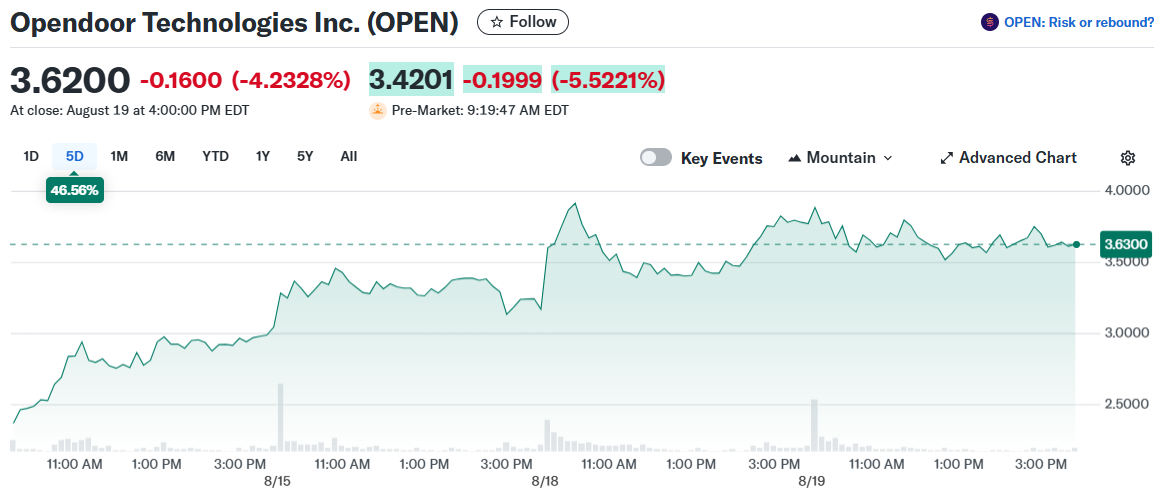TLDR
- CEO Carrie Wheeler stepped down immediately last week under pressure from activist investor Eric Jackson
- Stock gained over 19% Monday following the resignation news but pulled back 4.23% Tuesday
- Shares have rallied 500% since June 25 low of $0.51, now trading around $3.55
- Interim CEO Shrisha Radhakrishna appointed while board searches for permanent replacement
- Technical indicators show bullish momentum despite recent volatility
Opendoor Technologies stock continues its roller coaster ride as investors digest the sudden departure of CEO Carrie Wheeler and speculate about the company’s future direction.
The San Francisco-based real estate platform saw shares drop 4.23% on Tuesday to close at $3.62. After-hours trading showed another 1.93% decline to $3.55.

This pullback followed Monday’s impressive 19% surge after Wheeler announced her resignation on Friday. The CEO stepped down immediately under mounting pressure from activist investors.
Leadership Crisis Reaches Breaking Point
Wheeler’s departure came after weeks of intense criticism led by activist investor Eric Jackson. Jackson had been vocal about his belief that Wheeler was not the right leader for the company.
“Carrie Wheeler is not the leader to take $OPEN to $82 and beyond,” Jackson posted just a week before the resignation. “The board needs to act now.”
The pressure intensified when Opendoor co-founder Keith Rabois publicly criticized Wheeler on social media. Two days before her resignation, Rabois stated that no founder or executive who built the company supported Wheeler as CEO.
Wheeler defended her tenure in her departure announcement. She noted her mandate was to “stabilize the company and do what was necessary to survive” when she took over in late 2022.
Chief Technology and Product Officer Shrisha Radhakrishna now serves as interim CEO. The board has begun a formal search with executive recruitment firm Spencer Stuart.
Retail Investors Drive Massive Rally
The stock’s performance has been nothing short of dramatic. Shares have gained 500% since hitting a low of $0.51 on June 25.
This translates to year-to-date gains of 127% through Tuesday’s close. The rally has pushed the company’s market capitalization to $2.66 billion.
Much of this momentum came from retail investor enthusiasm. Jackson’s initial Twitter thread outlining an $82 price target sparked widespread interest on social media platforms.
Mentions of Opendoor exploded on Reddit’s WallStreetBets forum following Jackson’s posts. High-profile investors like Anthony Pompliano and hedge fund manager Paul Tudor Jones endorsed the leadership change.
Interactive Brokers strategist Steve Sosnick noted that stocks like Opendoor can “capture the public’s imagination.” He said these situations often “persist with a life of their own” once retail investors get involved.
The coordinated retail effort includes hundreds of product suggestions submitted to company executives. Activists have also identified potential merger opportunities.
Jackson and Pompliano have positioned retail investors as a “decentralized hedge fund” driving corporate governance changes. This approach represents a new form of shareholder activism.
The stock trades with high daily volume averaging 329.79 million shares. Tuesday’s trading showed continued volatility with shares climbing 6% at the open before reversing course.
Technical analysis reveals mixed signals. The stock recently formed a “Golden Cross” pattern where the 50-day moving average crossed above the 200-day average.
This pattern typically signals bullish momentum for institutional traders. Benzinga Edge rankings show the stock scoring 94.72 on momentum metrics.
However, growth scores remain weak at 10.54. Value metrics show a reading of 71.31, suggesting potential undervaluation relative to fundamentals.
Wall Street analysts remain more cautious than retail investors. UBS published a research note assigning a $1.60 price target, less than half of Tuesday’s trading levels.
The bank expects home price depreciation to remain a key challenge for Opendoor’s business model through at least the first quarter of 2026. UBS no longer sees the company returning to year-over-year revenue growth in 2026.
Short interest remains high at roughly 23% of the float as of Tuesday morning. This level of short interest could fuel additional volatility if prices continue rising.
The stock’s 52-week range spans from $0.51 to $4.97, showing the extreme price movements over the past year. Current levels suggest some consolidation after the dramatic rally.






